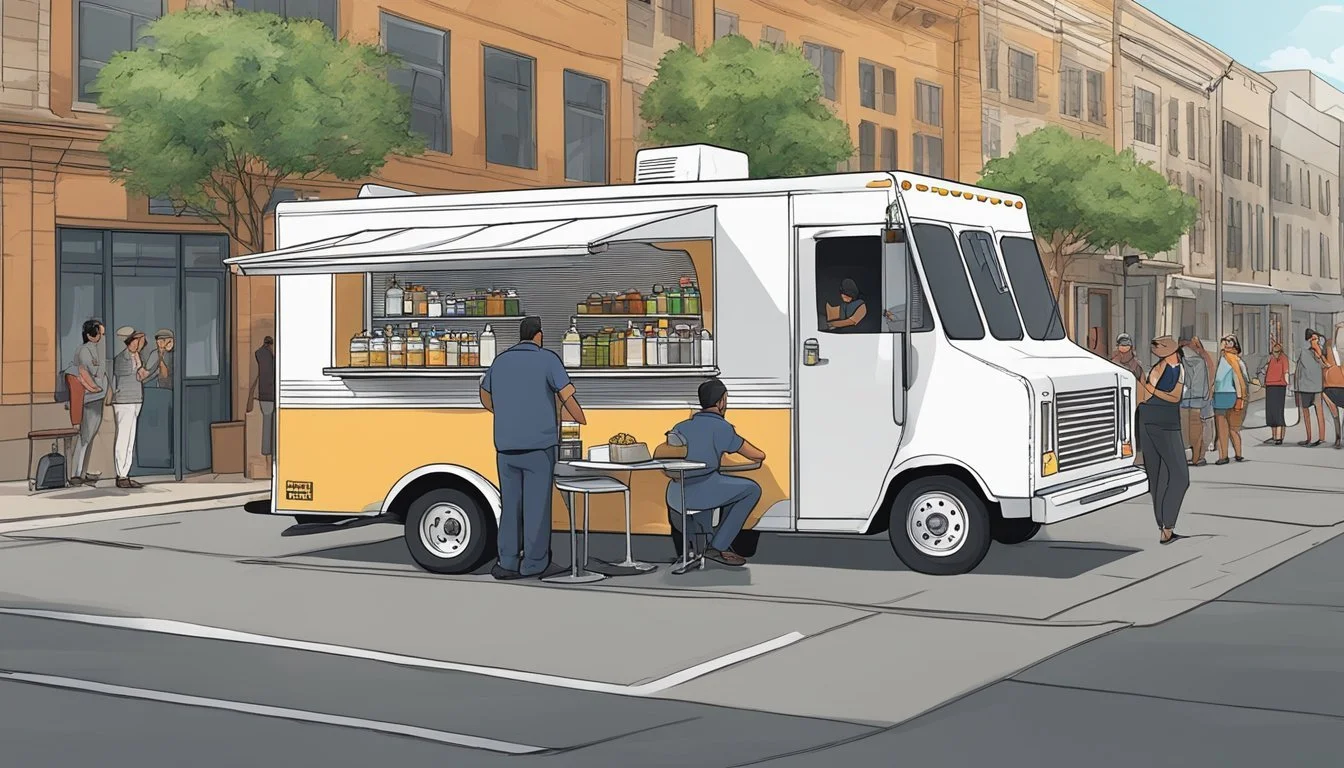Food Truck Laws Fort Worth, Texas
Navigating Regulations and Permits
Operating a food truck in Fort Worth, Texas, requires navigating a specific set of regulations designed to ensure food safety and community compliance. Food trucks, like any other mobile food vendor, must acquire permits that certify they have met the required health and safety standards. These permits signify a food truck's commitment to maintaining food safety, proper sanitation, and adherence to local codes.
The City of Fort Worth mandates that food trucks must meet additional requirements beyond those of traditional brick-and-mortar restaurants due to their mobile nature. This includes regular inspections to verify compliance with the City's health guidelines, obtaining a food handler's certificate for staff, and ensuring proper vehicle insurance and business registration. Potential mobile food vendors should be aware of the permit fees and procedures to avoid any legal inconveniences or disruptions to their service.
Moreover, food trucks are subject to inspections by the local Fire Marshal, and they must abide by zoning regulations that can influence where and how long a food truck can operate within city limits. These rules are carefully crafted to balance the entrepreneurial spirit of the mobile food industry with public health and safety. It is crucial for aspiring and current food truck operators in Fort Worth to be equipped with comprehensive knowledge of these laws to successfully run their business.
Starting Your Food Truck Business
Embarking on a food truck venture in Fort Worth, Texas, requires strategic planning, a careful selection of equipment, and securing adequate funding. Prospective entrepreneurs must ensure their business plan is comprehensive and their chosen truck aligns with their culinary offerings.
Creating a Business Plan
A well-structured business plan is crucial for a food truck business. It should outline the concept, menu, and a detailed strategy for success. A strong plan also includes a study of the local market to understand competition and consumer preferences.
Choosing Your Food Truck Type
Selecting the right type of food truck is pivotal — it should match the food being prepared and served. Whether opting for a new build-out or a preowned vehicle, the choice dictates the layout and the scale of operations. Entrepreneurs should consider their needs for mobility and space when making this decision.
Obtaining Financing and Funding
Securing the necessary funding can involve various channels, from small business loans to investment from partnerships. A clear financial plan assists in demonstrating the viability of the food truck business to potential lenders or investors.
Selecting the Right Equipment
The appropriate selection of equipment is essential to efficiently prepare and serve food. This can range from commercial-grade kitchen appliances to specialized utensils. The choices made here should reflect considerations of both the menu and the space available within the truck.
By adhering to these steps, entrepreneurs can lay a solid foundation for their food truck venture and navigate the Fort Worth mobile food landscape effectively.
Food Truck Registration and Legal Requirements
Initiating a food truck business in Fort Worth, Texas, requires meticulous attention to legalities, from entity registration to procuring the necessary insurance. Staying compliant with local regulations is a fundamental step toward launching a successful mobile food enterprise.
Registering Your Food Truck Entity
When establishing a food truck business in Fort Worth, registering the business entity with the Texas Secretary of State is crucial. This grants the business a legal footing to operate within the state. Prospective food truck owners must choose their business structure—such as a sole proprietorship, partnership, limited liability company (LLC), or corporation—and file the appropriate formation documents.
Choice of Entity: Sole Proprietorship, Partnership, LLC, Corporation
Required Documents: Formation documents specific to the chosen entity
Applying for Tax Identification Numbers
Obtaining an Employer Identification Number (EIN) from the IRS is a mandatory step for food trucks with employees and those forming a corporation or partnership. This federal tax ID number is essential for tax administration purposes and must be included in various legal documents.
Entity with Employees: EIN is required.
No Employees: Use Social Security Number (SSN) if sole proprietor without employees.
Securing Proper Insurance
Insurance is non-negotiable for food truck operators to protect against liabilities and unforeseen circumstances. Coverage requirements include vehicle insurance for the mobile food unit and business insurance to cover activities related to food service.
Vehicle Insurance: Required for the food truck.
Business Insurance: Coverage for food-related activities.
Each step in the registration and legalization process carves out a clear and risk-averse path for food truck vendors in Fort Worth, ensuring that they operate within the bounds of the law and are prepared for the business journey ahead.
Compliance and Permits
Operating a food truck in Fort Worth, Texas, requires careful adherence to both state laws and local regulations. Acquiring the necessary permits and passing inspections are crucial steps for compliance.
Understanding State and Local Regulations
In Fort Worth, food truck operators must navigate a complex landscape of state and local regulations designed to ensure public health and safety. State law mandates certain health and safety standards that apply to all mobile food vendors, while local authorities may have additional requirements. It's important to consult the City of Fort Worth's resources for detailed guidance on municipal code.
Acquiring Health and Safety Permits
To legally operate, food trucks need a health permit from Tarrant County Public Health, which indicates compliance with the health code. The permit fees are $385.00 annually, with employee fees at $5 per employee. A complete list of fee changes and health requirements can be found on the Fort Worth City's official website. Additionally, operators must ensure all employees attend mandatory food handler training.
Inspection Readiness
Food trucks in Fort Worth are subject to regular inspections to ensure they meet health and safety standards. Operators must ensure their food truck is in proper working order, with all cooking, storage, and sanitation facilities functioning correctly. This includes being prepared for an inspection from the local Fire Marshal as needed. Being proactive with the inspection process by understanding and meeting all inspection criteria is imperative for uninterrupted operation.
Food Handling Licensing and Training
In Fort Worth, Texas, specific requirements govern food handling licensing and training to ensure public safety. These regulations mandate appropriate certification for food handlers and managers, and adherence to established food safety protocols.
Food Handler and Manager Certifications
In Fort Worth, food handlers must obtain a food handler card after completing an accredited training program. This card is recognized statewide and serves as proof that the individual has learned necessary food safety practices. Moreover, a certified food manager must always be present during operating hours. They are required to pass a test and earn a certified food manager certificate, which includes more extensive training on advanced food safety principles.
Maintaining Food Safety Standards
Food safety standards are critical for operating a food truck in Fort Worth. It is imperative that all food handlers and managers routinely apply their training to prevent foodborne illnesses. This entails employing the proper procedures for food storage, preparation, and handling, which are taught during the required education programs. Periodic inspections ensure these safety measures are executed consistently, and the presence of a certified food manager is crucial to oversee and rectify any lapses in these standards.
Zoning and Location Strategies
When starting or relocating a food truck in Fort Worth, Texas, operators must carefully consider zoning laws and select locations that not only attract customers but also comply with city regulations. Navigating these rules is crucial for setting up a successful mobile food enterprise.
Selecting Operational Locations
Food truck operators should prioritize high-foot-traffic areas while ensuring their selected spots adhere to the City of Fort Worth Zoning regulations. It is important to verify that the desired location falls within the appropriate zoning district that permits mobile food vending. Additionally, proximity to other food vendors and types of nearby businesses can impact success.
Zoning District Guidelines
The City of Fort Worth's Zoning Ordinance provides specific guidelines for mobile vendors, including where and when they can operate. For example, operation hours are restricted in certain districts, typically excluding service between 2:00 a.m. and 7:00 a.m. Operators must refer to these guidelines to choose locations that are both legally compliant and strategically advantageous.
Considering Vehicle Parking and Accessibility
Parking and accessibility are key factors for food truck operations. Owners must take into account local traffic patterns and ensure their location provides adequate space for parking and customer queueing in alignment with ADA (Americans with Disabilities Act) regulations. Moreover, the location should be easily accessible to both pedestrians and vehicles without causing disruption to traffic or infringing on private tracts of land. Coordination with city council may be necessary when assessing the suitability of a location related to public access and traffic flow.
Food Truck Operations
Operating a food truck in Fort Worth involves several layers including menu creation, inventory management, efficient payment systems, and handling utilities. These are the core aspects that ensure a smooth operational flow and compliance with local regulations.
Developing an Appealing Menu
An effective menu balances customer appeal with operational feasibility. Food truck operators should design their menus to highlight signature dishes that not only entice but can also be prepared efficiently within a confined space. A streamlined menu could potentially reduce preparation time and waste while maximizing sales. In Fort Worth, food vendors usually select a menu that resonates with local tastes while also setting them apart from competitors.
Managing Inventory and Ingredients
Inventory management is pivotal for food truck success, necessitating a balance between variety and simplicity. Operators should maintain a periodic inventory checklist to track ingredients and supplies, ensuring that popular items are always available. Effective inventory leads to consistent food quality and can reduce instances of stock-outs during peak hours.
Setting Up Payment and Sales Systems
Modern payment systems are essential for maximizing sales. Food truck operators in Fort Worth have embraced various forms of payment, from cash to major credit cards, to streamline transactions. They should include systems that can handle quick transactions and, where possible, contactless payments to cater to customer preferences and enhance sales efficiency.
Understanding Utilities and Infrastructure Needs
Food trucks require access to electricity and water, along with proper sewage disposal methods to operate. Operators must have a clear understanding of the specific power and water needs of their equipment. They must adhere to the city's regulations regarding waste disposal and sustainability. Reliable utilities ensure uninterrupted operation and adherence to health codes, which is crucial for mobile food vendors.
In Fort Worth, it is also essential for food truck operators to consider the logistics of sales tax, as this affects their overall revenue and compliance with state tax laws. It’s critical these operational logistics are in place to serve food safely and legally.
Food Truck Design and Features
The design of a food truck in Fort Worth, Texas, must prioritize compliance with local regulations and the safety and efficiency necessary for operations. Essential design features include adequately installed water systems for sanitization purposes and secure display areas to store and sell food products.
Building a Compliant Food Truck
A successful food truck requires careful attention to a number of stipulations. Vehicles intended to operate within Fort Worth are mandated to function as a mobile food unit that adheres to the city's health and safety standards. These standards necessitate the inclusion of systems for both the provision of potable water and the sanitizing of utensils and surfaces.
Central preparation facilities, also known as commissaries, are commonplace for food trucks to manage food prep tasks that are unsuitable for the confines of a mobile kitchen. These facilities should provide additional equipment, including proper restrooms for staff, and act as a hub for the preparation and storage of ingredients ensuring a clean and controlled environment for food handling.
Design Requirements for Safety and Efficiency
Design features within a Fort Build food truck are crucial for maintaining food safety and operational efficiency. To prevent pest invasion, doors and windows must be tight-fitting, with windows often featuring a minimum 16 mesh to 1-inch screen. The walls and ceilings should have a smooth, easily cleanable surface, typically light in color to better identify cleanliness and maintenance issues.
For efficiency, the interior should maximize space while allowing for free movement of personnel to carry out cooking, serving, and cleaning. Strategically designed display areas for food not only attract customers but also serve a vital role in protecting food from contamination. Proper ventilation systems are also non-negotiable to ensure smoke and food odors are managed appropriately throughout operations.
Marketing and Customer Engagement
In Fort Worth, Texas, food truck laws intertwine with how vendors engage customers and market their mobile businesses effectively. Marketing strategies not only help sell food but also build a brand presence, while compliance with regulations, such as obtaining a vendor certificate of occupancy, underpins all operations.
Advertising Your Food Truck
Effective advertising strategies are crucial for any food truck looking to establish itself in Fort Worth's dynamic culinary scene. Placement of signage and offering menus that highlight popular or unique dishes can capture the attention of potential customers. Additionally, working within the city's guidelines to ensure that all advertising efforts are compliant is key.
Leveraging Social Media
For food truck owners, social media is an indispensable tool for customer engagement and business growth. Platforms like Instagram and Twitter allow vendors to showcase their offerings with high-quality images and updates. They can also inform followers of location changes—vital for mobile establishments—and create buzz around new menu items or promotions.
Participating in Local Events
Local events in Fort Worth can be a significant driver of food truck success. Vendors should consider aligning with neighborhood festivals or farmers' markets to increase visibility. Participation not only allows them to sell food directly but also creates opportunities for community engagement, essential for cultivating a loyal customer base.
Licensing and Regulations for Alcohol
Navigating the legalities of selling alcohol through a food truck in Fort Worth involves a thorough understanding of the requirements for obtaining a liquor license and adhering to the Texas Alcoholic Beverage Commission (TABC) standards.
Applying for a Liquor License
To sell alcohol in Fort Worth, food truck owners must apply for a liquor license through the local TABC office. The application process requires detailed documentation and often a fee. Applicants should provide proof of vehicle insurance and undergo an inspection process to ensure the food truck meets safety and health standards, particularly when alcohol is to be sold. For assistance with the process, you may contact the TABC office at 817-652-5912 or refer to the TABC guide for application forms and instructions.
Complying with Texas Alcoholic Beverage Commission Standards
Compliance with TABC standards is essential for maintaining a liquor license in Texas. This means adhering to all laws concerning alcohol sales, which include age-verification procedures and specific operating hours. Fort Worth food truck operators must also understand that the TABC enforces strict regulations to discourage over-service of alcoholic beverages. Regular inspections might occur to ensure compliance with these standards, and any violation could result in significant penalties or the revocation of the liquor license.
Closing Thoughts on Food Truck Legalities in Fort Worth
In Fort Worth, Texas, food truck operators navigate a regulatory environment shaped by both city ordinances and state requirements. The Texas Food Establishment Rules provide a foundational legal framework, while local oversight falls primarily to the Fort Worth city government and the Tarrant County Public Health Department.
Food truck proprietors must adhere to the specific permits and regulations, which have evolved to increase operational ease and promote business growth within the county. Fort Worth has made tangible efforts to reduce bureaucratic impediments, for instance, by instituting a new pilot program geared toward simplifying the expansion of food truck services.
Compliance with health and safety standards remains non-negotiable. Food trucks undergo in-field and annual inspections to verify adherence to city and state health protocols. This ensures public well-being and that food services on wheels meet the same rigorous standards as any stationary food establishment.
Food truck entrepreneurs in Fort Worth benefit from the tailored support of the city, which can positively impact their success during times of economic downturns and inflationary pressures. This reflective relationship between local business needs and legal structures demonstrates Fort Worth's dynamic approach to fostering an environment where mobile food units can thrive.










